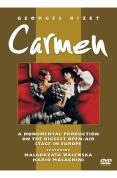 Mozart: Die Zauberflote (The Magic Flute) -- Ludwigsburg/Gonnenwein | DVD | (20/04/2001)
from £16.99
| Saving you £8.00 (47.09%)
| RRP
Mozart: Die Zauberflote (The Magic Flute) -- Ludwigsburg/Gonnenwein | DVD | (20/04/2001)
from £16.99
| Saving you £8.00 (47.09%)
| RRP In Die Zauberflöte, Mozart and his librettist Schikaneder brought off an extraordinary feat, uniting two seemingly unrelated theatrical genres--pantomime and straight play. The first is represented by the comic antics of the birdcatcher, Papageno, the second in a series of rituals through which a Prince and his lady pass in search of true love. This production from the Ludwigsburger Festspiele in 1992 in a minimalist staging by Axel Manthey with sets and costumes by him and Alexander Lintl, offers a clearly delineated path through a sophisticated and worldly plot that can be bewildering on first acquaintance. Claps of thunder herald evil in the presence of the Queen of the Night and Monostatos, while a white dove introduces Papageno and a larger one carries the three boys who lead the couple on their journey of enlightenment. Their departure in silhouette makes a touching finale to Act One. But no opera production in recent years seems to eschew some whim or trendy idea of the producer: here we have Sarastro's priests with shaved heads, the three boys dressed for a school sports day and a Papageno kitted out in knickerbockers who one fears might break into "I love to go a-wandering a knapsack on my back". Much more stylish are the Three Ladies, emissaries of the Queen of the Night, shapely figures in their striking royal blue and red dresses. The musical direction is in the safe hands of Wolfgang Gonnenwein who favours the occasional swift tempo as in the "March" to Act Two. The cast includes one exceptional singer, the soprano Ulrike Sonntag as Pamina, happily partnered by Deon Van Der Walt as Tamino. Thomas Mohr is the characterful Papageno and Andrea Frei as the Queen of the Night makes good the coloratura runs of her fiendishly difficult arias, though sounds less secure in her slow music. As Sarastro, Cornelius Hauptmann makes up for some wooden acting with his sonorous bass. One takes away from watching this production a renewed admiration for Mozart and his librettist for an opera that, in its mixture of spoken dialogue and musical numbers, anticipates by 150 years the musical shows of Rodgers and Hammerstein. --Adrian Edwards
 Carmen - Georges Bizet | DVD | (10/05/2008)
from £6.39
| Saving you £-1.40 (N/A%)
| RRP
Carmen - Georges Bizet | DVD | (10/05/2008)
from £6.39
| Saving you £-1.40 (N/A%)
| RRP The sultry town of Seville is the setting for Bizet's celebrated opera. Carmen is the tale of a promising young soldier Don Jose who throws away his military future having succumbed to the bewitching charms of a gypsy woman. Immersed by a passionate desire for Carmen Don Jose slowly unravels culminating in a tragic and emotional finale.
 Carmen | DVD | (24/10/2005)
from £N/A
| Saving you £N/A (N/A%)
| RRP
Carmen | DVD | (24/10/2005)
from £N/A
| Saving you £N/A (N/A%)
| RRP A gypsy woman working in a cigar factory in Seville catches the attention of a soldier. He obeys her every command and helps her avoid arrest even though she was under his command this in turn puts him in prison instead. After his release he then goes to search for Carmen in Lillas Pastia and he finds himself joining with Carmen at the cost of his military career. He struggles to keep up with the smugglers and at the same time preserve his claim on Carmen.

Please wait. Loading...
This site uses cookies.
More details in our privacy policy